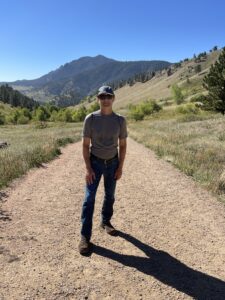
Dr. Levitt hiking in the Colorado Rocky Mountains. Dr. Levitt’s careful, long-term retirement planning strategy paid off, offering him the chance to spend his time the way he likes now.
By Alan P. Levitt, OD
June 21, 2023
Certain colleagues want to work forever. Others, because of poor planning, circumstances, family issues, or tragedy, must work forever.
Some will want to practice part-time, on their own schedule, and cherish their newfound flexibility after decades of regimentation. Many will want to explore other avenues and interests, turn the page and never practice again.
Your New Life Outside the Office
It’s a huge emotional and identity change transitioning from 40 odd years of practice, planning, saving, investing, re-evaluating and modifying your plans to now living this new life and utilizing the resources you spent an entire career accumulating.
How do you plan to use your capital and fulfill your dreams while potentially leaving a legacy to life partners, future generations or favorite charities? We all know that our remaining years of health, mobility and cognizance are limited and precious.
First, recognize that it will take time to adjust to this new reality. Before relinquishing practice, make a list of what you hope to do and put it in a place you can see it every day. Write down the things that will bring you joy, purpose and fulfillment beyond being an optometric physician, manager or practice owner. Pace yourself; Italians recognize the benefits of “dolce far niente” or “pleasant idleness.” Don’t rush to complete your entire retirement wish list in the first six months. New interests and skills will likely develop while some older ones may lose their appeal.
Thoughtful Planning, Investing & Spending Leads to a SWAN (Sleep Well At Night) Retirement
Hopefully you began saving for retirement in tax-advantaged accounts early in your professional career to take maximal advantage of compounding growth over time. Strive to create a balance between enjoying the present while saving for the future. As your income increases, live below your means and ramp up your savings and investments. Always maintain an emergency/reserve fund for unexpected expenses.
Never put all your investments in just one basket. If you have a practice you plan to sell, do not expect the sale proceeds alone to fully fund your retirement years. Look to create multiple sources of passive income, such as rental residential or commercial real estate, dividend paying stocks, bonds, real estate investment trusts (REITS), closed-end funds, business development funds or annuities.
Try to defer claiming Social Security past your full retirement age (up to age 70 if possible) to maximize your monthly benefits. To prepare for the possibility that you will need long-term care, either purchase a long-term care policy between ages 55 and 60 or earmark specific investments to self-fund, so you are not a financial burden to loved ones.
Well before retirement, track your expenses for 3-5 years so you know how much income you will need to live a SWAN life within your means. Pay off all short-term debt before you reduce or stop working.
Use the Bucket System to build a significant cash reserve for the early retirement years, so if financial markets tumble during, or soon after, your transition, you won’t have to sell investments to pay your current bills and risk reduced future income. Once retired, passive income, Social Security and savings will hopefully pay for everyday living expenses, vacations, health insurance, estate planning and gifts without having to sell investments.
Other Articles to Explore
Take 1-2 years after retirement to test your plan and adjust spending or investments accordingly before possibly splurging on large elective purchases such as a boat or vacation home. If something is a lifelong dream, and your savings and resources allow it, then certainly buy it.
Alternately, renting that boat or vacation home only when you plan to use it maximizes flexibility and is often a more efficient use of your time and money. Make the rental costs part of your budget, remain fully invested and avoid the stress, time and expense related to maintaining possessions you only use part-time.
Now, Go Have Fun! You Earned It.
Do something every day that brings you joy and a sense of accomplishment. Travel or learn something new. Maintain your health with good nutrition and thoughtful food choices, exercise daily, improve your balance and strength, and cherish time with family and friends. Give back in whichever way gives you fulfillment. Create your own best life outside the office.
 Alan P. Levitt, OD, now retired, was a practice owner in Miami, Fla, for over three decades before selling his practice in 2021. To contact him: idocalmiaf@aol.com
Alan P. Levitt, OD, now retired, was a practice owner in Miami, Fla, for over three decades before selling his practice in 2021. To contact him: idocalmiaf@aol.com

























